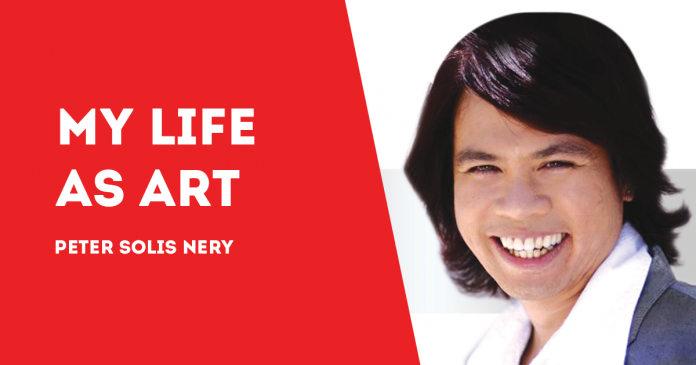
“HEART of My Youth” by Peter Solis Nery compiles three of his early memoirs written in the late 1990s.
Published in the US this August 2020, the book contains “The Essential Thoughts of a Purple Cat” (1996), “Moon River, Butterflies, and Me” (1997), and “My Life as a Hermit” (1998).
Previously in this column, F. J. Parlan, quarantined in Metro Manila, wrote about the difficulty of writing an introduction to a Peter Solis Nery book, being a “fan” and a graduate of a PSN online writing workshop. But then, he proceeds by writing an open letter extolling the virtues of “My Life as a Hermit”.
Here’s the second part of Parlan’s modern and creative introduction to an “old” book.
*
An Open Letter To Hermit Peter, Part2
by F. J. Parlan
*
How did a young adult like Hermit Peter come up with such prodigiously sage advice? How did an old youth like Hermit Peter apply classic commentaries on contemporary times? How did a world-weary Hermit Peter make worldviews sound unique yet familiar?
The answer, in the distinct drawl of the great Bob Dylan, “is blowing in the wind”… if these letters were blown away never to be reprinted. Surely, there are other letters in between the nineteen chosen here which bring to light the other party, but once a reader gets past the intrigue about Ishi, it is time to be enlightened about things beyond the writers in the exchange.
*
In terms of choosing, I love how you chose letters written on or close to holidays and events as they made relevant the social issues which you never forgot to incorporate with your worldviews. The selection was interesting because in your Hermitage, you refused to get out of touch with what’s happening outside; and in your correspondences, you allowed yourself to get in touch with people on the outside.
*
I am amused, though, of how you handled being a hermit. I hope the readers will be as amused at how you adapted and adjusted, whether arbitrarily or necessarily, along the way. I believe witnessing Hermit Peter’s metamorphosis was the narrative that drove this story along.
Even with your version of being a Hermit, I still imagined how boring it can be. You made it sound less boring, for sure, by making the mundane seem to matter—a mark of being a bona fide writer, I guess. (This was you, pre-Palanca, but I won’t be able to tell if this version of you is post-Palanca if the book didn’t tell me the year.)
*
That initial process of editing made every letter more meaningful, not to mention giving you a chance to showcase what you know about your experiences, travels, and friendships. With every experience you shared, there was a lesson. With every travel you mentioned, there was a reflection. With every friendship you told, there was a memory. The letters here are relatively short, presumably due to your number of correspondences, yet they are as compacted as can be. A lesson in brevity; a lesson in the art of letter writing.
*
So reading through these letters should have been a breeze. But what could have been a three-cups-of-coffee sitting turned into a three-week reading because of the profundity of personal philosophizing which was, as I said, compacted into 75 pages. What remains — or what you retain — of these philosophies now that you are in your 50s is something I would like to ask personally.
But the present “I” had to slow down reading because the past “you” didn’t slow down writing. It’s like, as Billy Joel reminded me in Vienna: “slow down, crazy child, you’re so ambitious for a juvenile!”
*
You created with what you wrote a world of your own, where people like Ishi (gladly) only existed in it. While I, myself, saw some of myself in your story. Every time you wrote about being alone then (by choice), I couldn’t help but see myself being alone now (by circumstances).
Hermit Peter would have easily survived the pandemic of today. That may be another reason this book is republished at the right time. Beyond that world, though, was a dream. A dream called Peter’s Place. And I see Peter’s Place as Hermit Peter’s idea of heaven. (Another reader can see it differently.)
*
“Dreams are crazy until they come true,” states my favorite Nike ad, with a redeemed Dirk Nowitzki raising his hands in victory. That has been the wallpaper of my iPod since his legacy-making championship run in 2011.
I feel like sharing this because in your unwavering ideal dream to be a saint, I saw my wavering impractical dream to be a hero. Being a saint and being a hero both take bravery, and you took that bravery upon yourself by becoming St. Peter by way of Hermit Peter.
“Jessie on the cross has shown the way; the only way to do it is to go all the way,” you said.
By the way, the way you buddy-buddied with the saints in the name of Jesus was another source of amusement in your story of martyrdom!
*
Speaking of martyrs, another thing: in moments of questioning whether Hermit Peter was soaring to the heights of intellectuality or plunging to the depths of insanity, I related by remembering my own ascent/descent with Rizal’s Pilosopo Tasyo: Was he a philosopher or a crazy person?
In hermitage and quarantine, Lucy (as in Lucifer — see what I did here, Pete?) may seem to be whispering to some, and one way to expunge them is through the catharsis of writing. In writing letters, we pacify those irrationalities by reducing our loneliness. (To be continued/PN)

